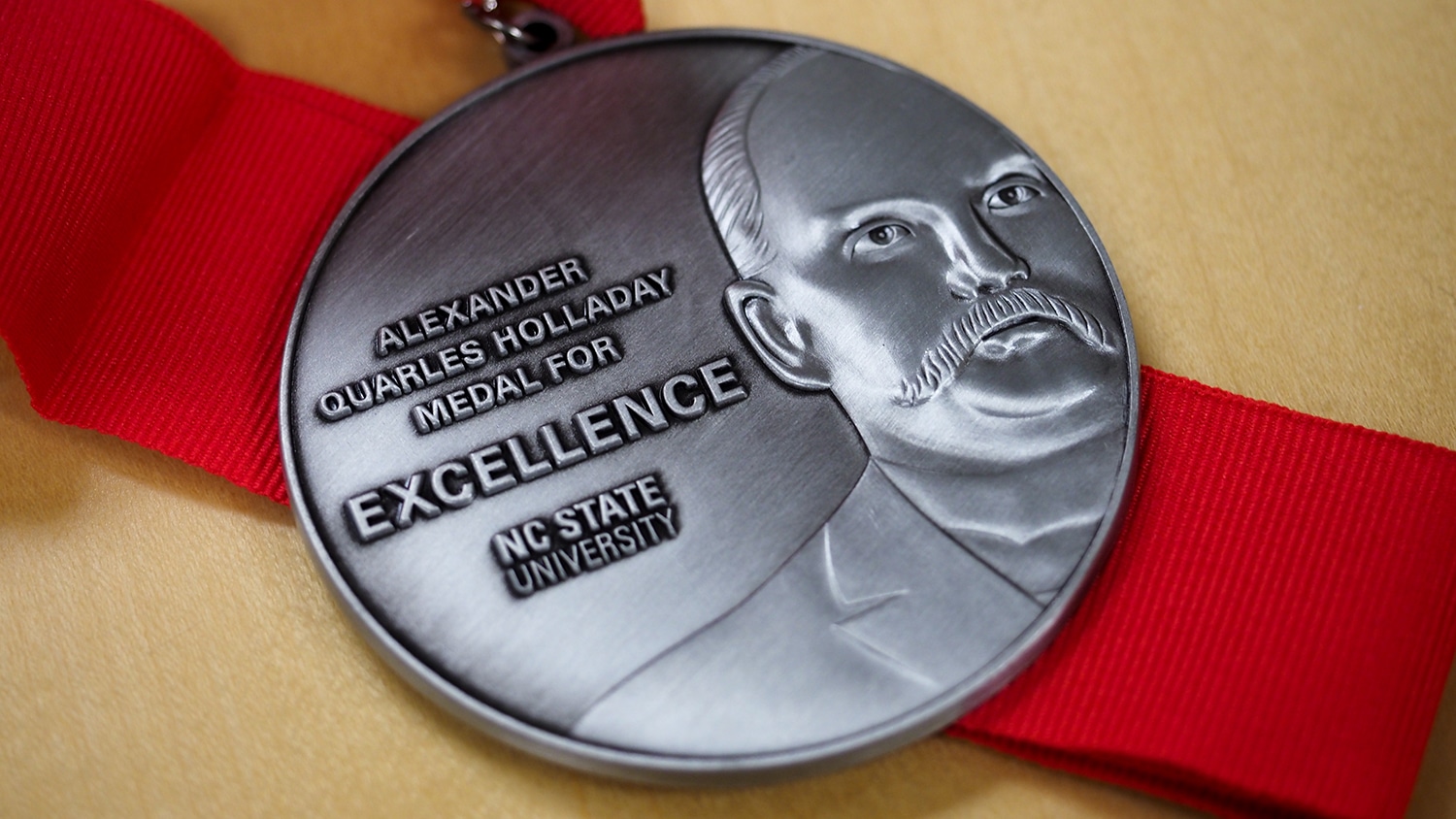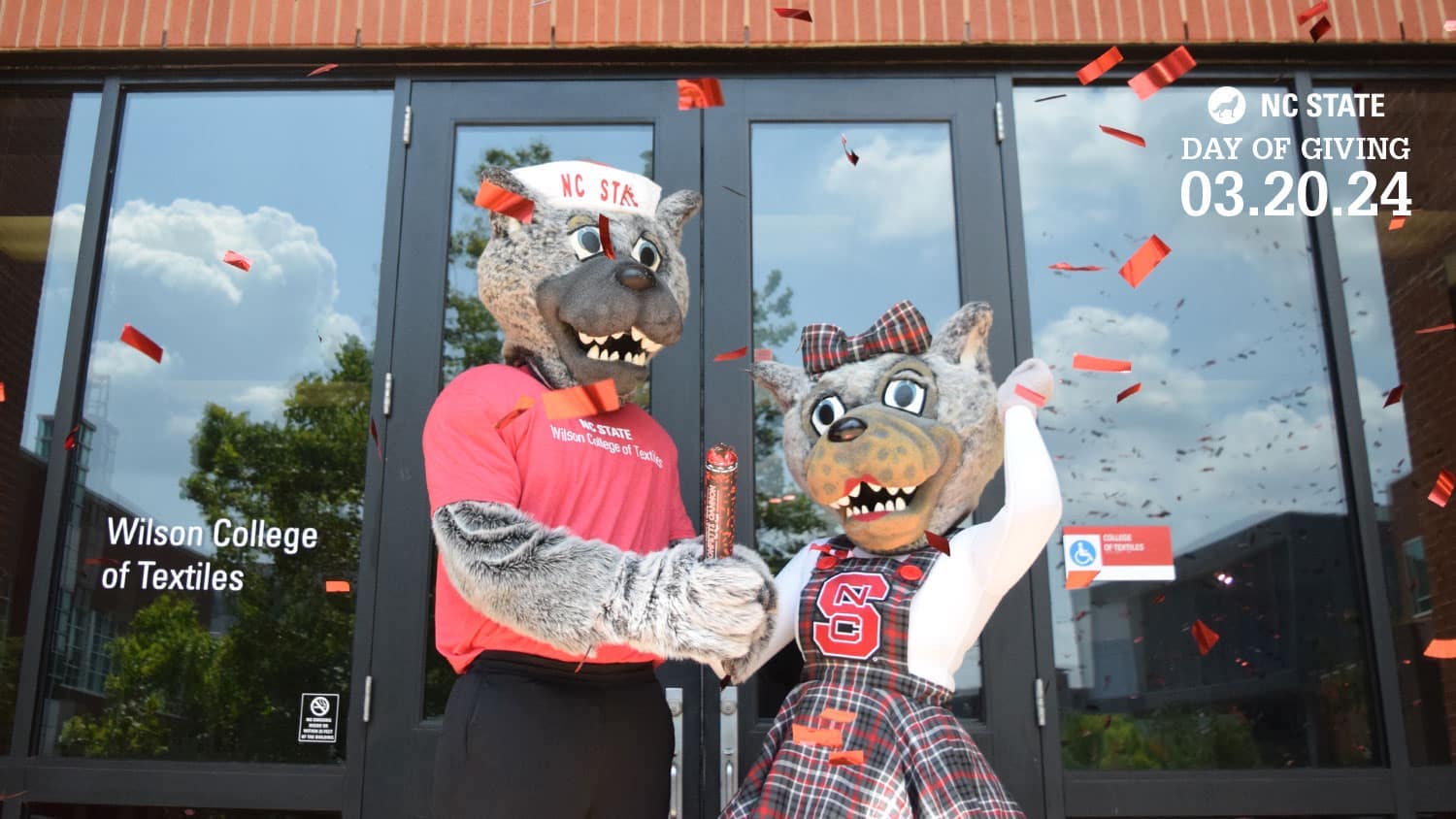NC State Honors Two with Prestigious Watauga Medal
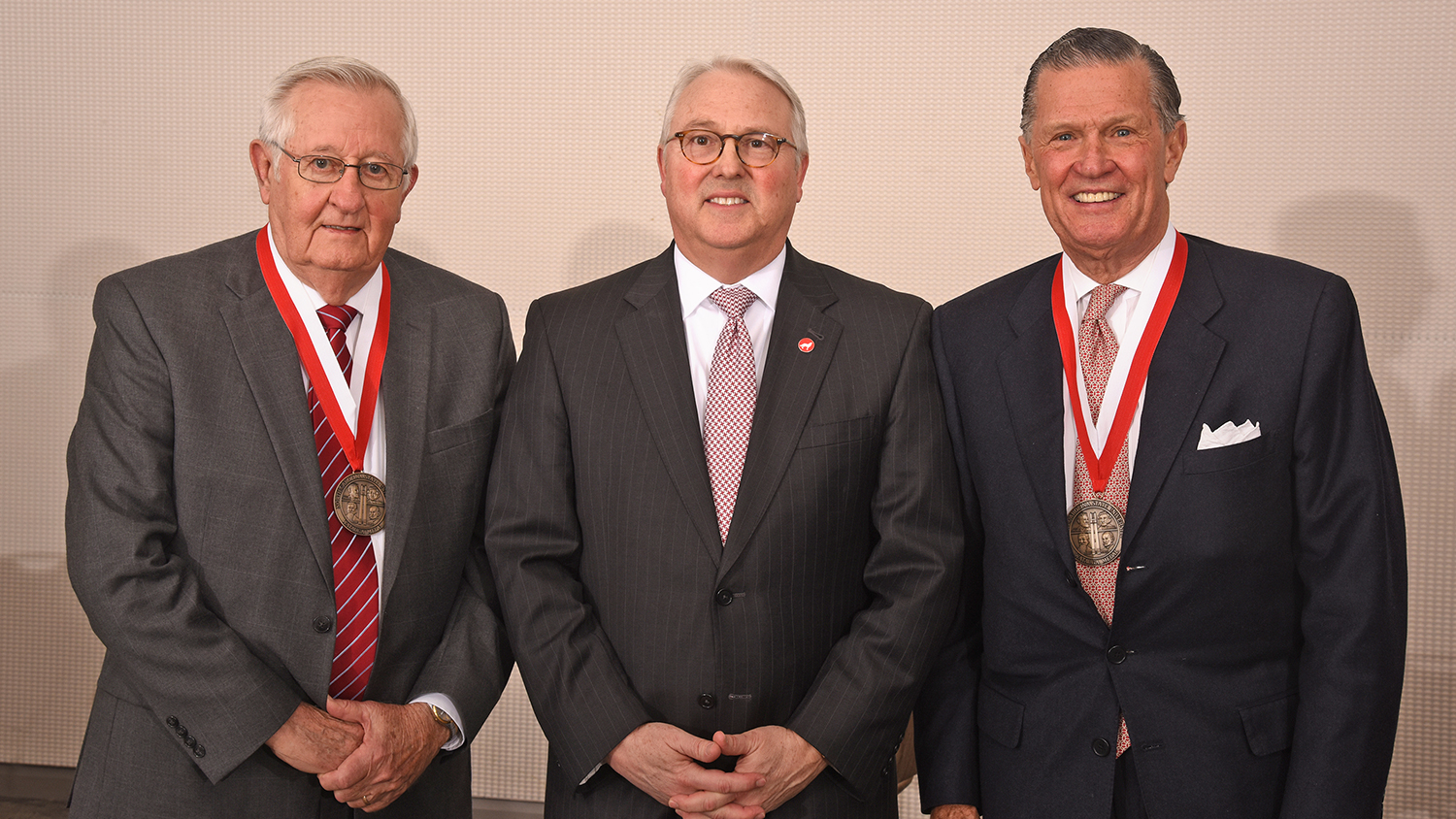
William K. “Bill” Collins Sr. and Benjamin P. “Ben” Jenkins III are the latest recipients of the Watauga Medal, NC State University’s highest nonacademic honor.
Chancellor Randy Woodson and Jimmy Clark, chair of the university’s Board of Trustees, presented the medals Friday evening in the ballroom at Talley Student Union during the annual Founders’ Day celebration dinner.
Since 1975, the Board of Trustees has bestowed the Watauga Medal to individuals in recognition of notable and distinguished contributions and commitment to the advancement of NC State – and, in turn, to the success of public higher education and the state of North Carolina. Collins and Jenkins are the 116th and 117th recipients, respectively.
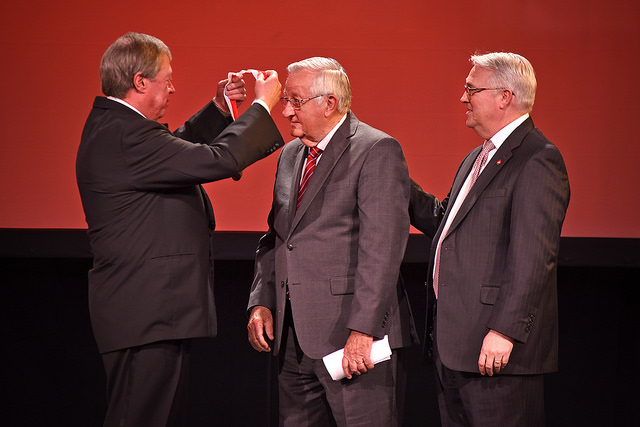
Collins, a native of Vance County and resident of Raleigh, was the first in his family to go to college. He earned a bachelor’s degree in agronomy – as 1954’s Most Outstanding Senior in Agronomy – and a master’s in plant breeding from NC State, before earning his Ph.D. in crop breeding at Iowa State. Collins joined the NC State College of Agriculture and Life Sciences’ faculty in 1966 and became known internationally as a tobacco and agronomy expert – a prolific and tireless author, advocate, trainer, educator, mentor and fundraiser.
“He is a true leader in agriculture, known by so many people, in so many sectors – academia, government, corporations, extension offices and, most importantly, local family farms,” Woodson said. “His list of awards and honors is lengthy, extraordinary even, and it includes being elected to the Order of the Long Leaf Pine by Governor Pat McCrory in 2016.”
Despite technically retiring from fulltime university service twice, Collins – whose resume includes work as an extension specialist, holder of the Philip Morris Professorship, leader of the crop and soil sciences department, coordinator of tobacco programs and senior director of development – maintains a campus office, travels regularly for agriculture efforts, and continues to contribute to university advancement and leadership programs.
The 2014 CALS Distinguished Alumnus Award winner and the 2012 Alumni Association Meritorious Service Award winner, Collins has chaired the Forever Club and served on the Alumni Association Board of Directors, the NC Cooperative Extension Agricultural Programs Foundation Board, the Park Alumni Center Docent Volunteers, and the Faculty and Staff Giving Advisory Council. He is a founding member of the State Club, a lifetime member of Friends of the Library, a member of the Association of Retired Faculty, the University Club and the Friends of the Gregg museum, and an honorary lifetime member of the Alumni Association.
Collins and his wife, Ann, are members of NC State’s Charles William Dabney Lifetime Giving Society and R. Stanhope Pullen Society. They have led establishment of endowments for a distinguished professorship in tobacco research and extension and for a tobacco agronomist research, teaching and extension position, and provided support over six decades for NCSU Libraries, the Caldwell Fellows, JC Raulston Arboretum, 4-H, athletics, and other scholarships and programs across campus. A few years ago, the couple’s three children established a Caldwell Fellows endowment to honor them and their love for the university, the College of Agriculture and Life Sciences, students and each other.
Collins said that NC State has been the key to his success – and showing him that success has much more to do with developing solid values and relationships with people than with financial wealth.
“I want to thank all the people who helped me get here,” Collins said at the ceremony. “I thought I’d arrived in paradise when I got to campus because of all the opportunity I found. It helped me so much in my choices in life. I know the members of the Watauga Club would want us to make sure kids still have those opportunities and those choices.
Jenkins, a native of Asheboro and resident of Charlotte, also has deep roots with NC State. His father was an alumnus who worked for the NC Cooperative Extension Service and loved attending Wolfpack athletics events.
Jenkins graduated from NC State in 1968 with a degree in textile chemistry. He earned an MBA from the University of Alabama and went on to a successful career in the financial industry, highlighted by 38 years with the Wachovia Company that included service as vice chairman and president of the General Banking Group.
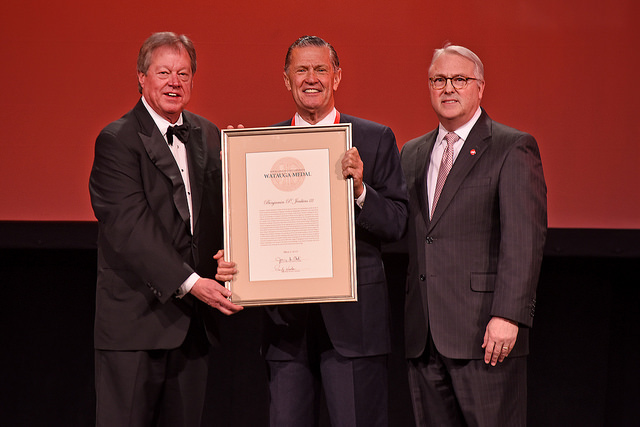
“As successful as Ben has been, what’s just as impressive is his desire to help other people – and NC State – succeed,” Woodson said. “He has been an incredible leader and advocate for the university, whether he’s chairing the Board of Trustees, endowing three distinguished professorships, increasing support for the 4-H program, meeting with graduate students to offer career advice, judging student showcase projects, or contributing his time and talents in so many other ways.”
Jenkins was an early supporter of Poole College of Management and advocate for its hands-on approach to managing innovation and technology in business and industry, driving entrepreneurship and economic development. He has played a vital role in its growth and development, and the Jenkins Graduate School of Management is named in his honor.
A former chair of the Board of Trustees, he has served on the Board of Visitors, the Graduate School Advisory Board and the PCOM Dean Nomination Committee. He has been honorary chair of the 4-H Gala and co-chair of Poole College of Management’s Achieve! Campaign Steering Committee and is a member of the Board of Trustees of the Endowment Fund.
Along with his wife Marianne, Jenkins is a member of the William Joseph Peele Lifetime Giving Society. Their support includes establishment of the Jenkins Graduate Endowment to support the PCOM 21st Century Fund and three distinguished professorships that benefit the disciplines of accounting, economics and entrepreneurship, as well as investments in NCSU Libraries, athletics and other scholarship and program efforts.
Jenkins was 2016 recipient of the NC State University Foundation’s Menscer Cup and the 2008 Poole College of Management Person of the Year honor. He is a lifetime member of Friends of the Library and member of the Alumni Association.
“This is a tremendous honor, and I’m deeply grateful,” Jenkins said after receiving the medal. “I’m grateful to so many for the opportunities I’ve had to be involved here.”
“Tonight would certainly mean a lot to my dad. He was someone who absolutely loved and revered this university, and I feel like I share this award with him, which makes it very special.”
Founders’ Day honors the North Carolina’s General Assembly’s March 7, 1887, passage of legislation authorizing the establishment of a new public institution of higher education. The cornerstone for this new North Carolina College of Agriculture and Mechanic Arts, which became NC State, was laid in August 1888 and the school welcomed students in October 1889.
The Watauga Medal’s name derives from the Watauga Club, a group founded in 1884 by young men to promote the educational, agricultural and industrial development of the state, including the establishment of the university. The medal depicts three club members – William Joseph Peele, Walter Hines Page and Leonidas Polk – along with Justin Morrill, the U.S. congressman from Vermont who sponsored the Morrill Act of 1862.
That legislation provided federal resources through a land-grant program to support public higher education and led to the opening of several dozen institutions including NC State. Goals included integrating more applied science and practical technology into curricula dominated by classical and theoretical studies, and providing greater opportunities for children of the middle and working classes, instead of only a select few people having access to education.
- Categories:
